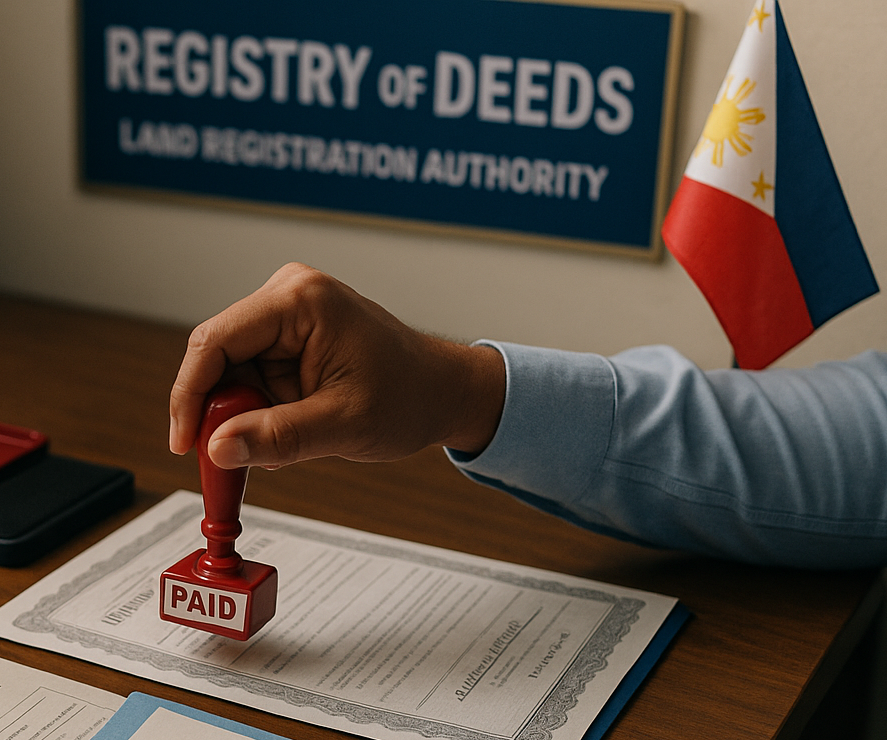Published on September 14, 2025
Buying property in the Philippines is a major investment, but the process doesn’t end when you sign the Deed of Absolute Sale. To fully secure ownership, you must transfer the property title under your name. This ensures that you are legally recognized as the rightful owner and protects you from disputes in the future.
When a property changes ownership, the title must also be legally transferred to reflect the buyer’s name. It may seem complicated at first, but by understanding each step, property buyers and sellers can avoid costly mistakes, delays, and ensure a smooth and lawful transaction. This ensures that the new owner has full rights over the property, free from disputes or claims. The property title transfer process can seem overwhelming, but with the right knowledge, it becomes straightforward. Here’s a complete guide on how to transfer land or condominium titles in the Philippines.
- Assessor’s Office: Initial Records Check
- Secure certified true copies of the latest Tax Declarations for land and improvements (or a Certificate of No Improvement if applicable).
- Verify the Property Identification Number and check for discrepancies in property details.
- Treasurer’s Office: Real Property Tax Clearance
- Obtain the latest Real Property Tax (RPT) clearance and receipts after settling any outstanding taxes.
- Registry of Deeds: Certified True Copy of Title
- Request a certified true copy of the current Transfer Certificate of Title (TCT) or Condominium Certificate of Title (CCT) and review any annotations.
- Preparation and Notarization of the Deed of Absolute Sale (DOAS)
- Draft and notarize the DOAS, ensuring complete details, TINs, and valid IDs of both seller and buyer.
- Include marital consent, SPA, corporate resolutions, or estate documents if applicable.
- Bureau of Internal Revenue (BIR): Tax Payment and CAR Issuance
- Submit all required documents, including the old title copy, old tax declarations, and RPT clearance.
- Pay Capital Gains Tax (6%) and Documentary Stamp Tax (1.5%).
- Secure the Certificate Authorizing Registration (CAR) and stamped DOAS.
- Treasurer’s Office: Local Transfer Tax Payment
- Present the CAR and stamped DOAS to pay the Local Transfer Tax and obtain the official receipt.
- Registry of Deeds: Issuance of New Title
- Submit the CAR, stamped DOAS, Transfer Tax OR, original title, and other requirements.
- ROD cancels the old title and issues a new TCT/CCT in the buyer’s name.
- Assessor’s Office: Final Tax Declaration Update
- Present the new title, CAR, and stamped DOAS to request issuance of new Tax Declarations in the buyer’s name.
- Assessor updates the property records, officially completing the title transfer.
Estimated Timeline
The entire process may take anywhere between 2 to 6 months, depending on the city or municipality, completeness of documents, and processing speed at government offices.
Here’s a rough breakdown:
- Document preparation & notarization: 1–2 weeks
- BIR processing (CAR issuance): 1–3 months (this is usually the longest step)
- Local Treasurer’s Office taxes: 1–2 weeks
- Registry of Deeds (new title issuance): 2–6 weeks
- Assessor’s Office (tax declaration update): 1–2 weeks
Estimated Costs of Title Transfer
Costs vary depending on the property’s selling price, zonal value, or fair market value (whichever is higher). Below are the typical charges:
- Capital Gains Tax (CGT): 6% of selling price or zonal value
- Documentary Stamp Tax (DST): 1.5% of selling price or zonal value
- Transfer Tax (Local Treasurer’s Office): 0.5% – 0.75% (varies per LGU)
- Registration Fee (Registry of Deeds): Around 0.25% of the selling price
- Notarial Fees: Depending on the property value and fees of the notarizing lawyer
- Other Miscellaneous Fees: Certified true copies, processing fees, etc.
Rule of Thumb: Total taxes and fees usually add up to 8%–12% of the property’s selling price.
Tips for a Smooth Title Transfer
- Double-check requirements – Each LGU and Registry of Deeds may have specific documentary requirements.
- Settle taxes promptly – Delays in paying Capital Gains Tax and Documentary Stamp Tax can lead to penalties.
- Keep multiple copies – Always request certified true copies of all official documents.
- Seek professional assistance if needed – For complex transactions (e.g., inherited properties or corporate sellers), consulting a lawyer or real estate service provider can save time and reduce errors.
Final Note: While this guide provides the essential steps, it’s always wise to double-check requirements with the respective government offices or seek professional assistance, especially for complex transactions involving estates, corporations, or multiple heirs.
Understanding the complete title transfer procedure is crucial for anyone involved in real estate transactions. It ensures compliance with the law, minimizes risks, and safeguards the rights of property owners.
Disclaimer:
The contents of this website are for general information and educational purposes only and do not constitute legal advice. No attorney-client relationship is formed by using this site. We strive for accuracy, but we cannot guarantee that the information is always up-to-date or error-free.
Use of this site and its contents is at your own risk. This website and its authors disclaim any liability for any loss or damage, whether direct, indirect, incidental, consequential, or otherwise, arising from the use or misuse of the information provided on this website.
For specific legal advice, please consult our law firm: CONTACT US
IT'S ALWAYS WISE TO DOUBLE-CHECK REQUIREMENTS WITH THE RESPECTIVE GOVERNMENT OFFICES OR SEEK PROFESSIONAL ASSISTANCE

VINCENT PAUL S. PANGAN
MANAGING LAWYER





